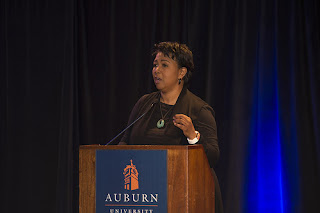 |
| Dr. Mae Jemison at Auburn University |
you know that she wants us not to focus exclusively on STEM, although this is important, but to teach the arts and sciences together.
At her talk at Auburn this week, this point was still an important thread, as her examples of how Star Trek fiction foreshadowed certain technologies we have today, like tablets or cell phones. However, her focus was on how important inclusion is when it comes to achieving full human potential (as in, all of us achieving this together). Inclusion is essential, but not necessarily embraced by all people. Her example of how legislation can shape inclusion was fascinating -- with the signing of the Equal Rights act, Lyndon B. Johnson forced companies, universities, any other institution receiving federal funding to hire more inclusively. Considering that many of the U.S. space research centers are housed in the Southeast, this must have led to some very interesting discussions -- do we take the money and hire experts we have never hired before or do we not take the funding and stay stuck in our outdated mindset of how the world works?
Her second point I thought was interesting was that while working out the science of how to get us to the next solar system is of course important, what is more important is to figure out human behavior -- how can we ensure that on that long journey, people will stay positive, stay focused, stay a member of the community?
The third point I took away from the talk was the reframing of certain jobs as being part of STEM (and thus important) -- we do not only need folks with graduate degrees in the natural and social sciences to make all of this happen; we need to value just as much the electricians, the carpenters, the builders who transform the ideas into reality on a daily basis and who know how to troubleshoot this new reality.

